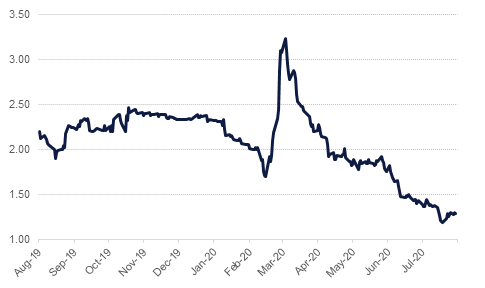
The Federal Reserve pulled back on some of its unconventional levers according to the minutes of the July FOMC meeting, saying that providing stronger forward guidance would only be “appropriate at some point” and assessing that yield curve control would only provide “modest benefit” for the economy. However, they committed to their inflation strategy review and seemed to endorse the view of several speakers that the Fed would be comfortable with inflation over-shooting its 2% target if that meant prices were rising sustainably. The Fed will also keep rates on hold until the economy has improved from the coronavirus pandemic but the dataflow is likely to be jagged as the economy recovers, clouding the underlying performance as to whether the US economy is on a sustainable growth footing.
Inflation in the UK unexpectedly popped in July to 1% y/y compared with market expectations of around 0.6%. Fuel prices helped to push headline prices higher while core inflation rose to 1.8% from 1.4% a month earlier thanks to higher clothing and furniture costs. Prices are likely to slip back in the UK, however, as government measures to cut back on VAT should lower costs and retailers may take the opportunity of more open high streets to offer sales. Sterling showed little initial reaction to the higher than-expected-inflation, falling on the day while gilt yields remain within their recent trading range.
Kuwait’s finance minister warned parliament that the government might not have enough funds in its treasury to cover government salaries from October. Earlier this week an economic committee rejected a proposed debt law that would allow Kuwait to tap international bond markets to raise capital. Kuwait had been looking to raise as much as KWD 20bn and without access to debt, it will be running down its reserve assets quickly to cover costs. We estimate Kuwait will record a budget deficit of around 22.5% of GDP this year as revenue collapses in in line with lower oil prices.
Indonesia kept interest rates on hold at 4% overnight to help stabilize a sagging currency and contend with the economy’s first contraction in two decades. Bank Indonesia has taken the unorthodox step of directly purchasing bonds from the government, up to as much as USD 27bn worth. The rupiah has weakened by more than 6% since the start of the year, the weakest among Asian emerging market peers.
 Source: Bloomberg, Emirates NBD Research
Source: Bloomberg, Emirates NBD Research
Treasury markets generally ignored the Fed minutes as there was little to suggest any imminent—or indeed long-term—move in rates was coming and there were no additional plans to expand quantitative easing. Yields were slightly higher toward the long end of the curve, albeit marginally so: 2yr UST yields closed slightly lower at 0.139% while yields on 10yr UST were up 1bp to 0.68%.
Gilt yields were the notable outlier in European markets, with 10yr yields up by almost 2bps to 0.23% even as markets generally looked past the surprise uptick in July inflation in the UK. Elsewhere yields in Europe were largely lower by around 1bp.
Emerging market bonds have been losing some steam recently with the USD EM index down by around 0.6% from its recent year-to-date peak on August 11. Spreads over treasuries have also pushed up slightly and around now close to 360bps.
The dollar advanced on Wednesday ahead of the release of the minutes of the July FOMC meeting. The DXY index increased 0.7% and currently trades at 93.020. USDJPY subsequently rebounded to the 106 handle.
As a result of the dollar's upwards spike in the evening, major currencies paired against it experienced sudden declines. The euro slipped by -0.78% to reach 1.1838 after reaching a daily high of 1.1953. Sterling looked to earn modest gains after some positive inflation data out of the UK, but then declined by over 1% to trade at 1.3100. Both the AUD and NZD also experienced moderate declines and now sit at 0.7180 and 0.6560 respectively.
The release of the minutes from the last FOMC meeting was weighing on equity markets last night, as the more pessimistic outlook for a second-half recovery drove risk-off sentiment. The S&P 500 closed down 0.4%, having been trading at new record highs earlier in the day, and while Apple was briefly the index’s first USD 2tn company, it too closed lower when trading finished. European equity indices closed up, with the FTSE 100, the DAX and the CAC gaining 0.6%, 0.7% and 0.8% respectively. However, they are likely to open lower, with the UK benchmark index futures trading down 0.8%.
Oil markets showed little reaction to the OPEC+ JMMC meeting with both Brent and WTI holding tightly to their current trading range. As expected OPEC+ did not change policy on production levels and instead focused on the outlook for oil demand returning to pre-coronavirus levels. An improvement in demand is vital if OPEC+ countries ever want to raise output back to normal levels. The JMMC communique noted that demand was facing “growing risks of a prolonged wave” of the coronavirus, tempering the outlook for producers.
EIA data was less robust than API figures reported earlier in the week with crude inventories declining by just 1.6m bbl last week. Gasoline stock did fall, however, opposing the API’s view of a near 5m bbl build. Production was unchanged at 10.7m b/d while product supplied fell back sharply by 2.2m b/d. Product demand is still substantially lower than year-ago levels: gasoline demand was down by 13% y/y while jet fuel consumption was off nearly 50% y/y.